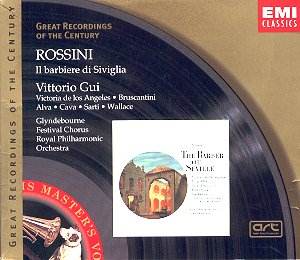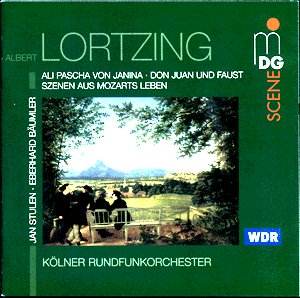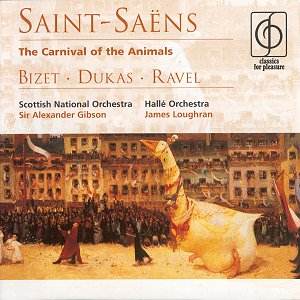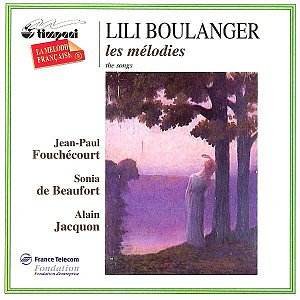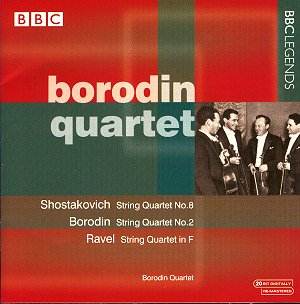 Composer: Maurice Ravel
Composer: Maurice Ravel
Works: String Quartet in F; Dmitri Shostakovich – String Quartet No. 8 in C minor, Op. 110; Alexander Borodin – String Quartet No. 2 in D
Performers: Borodin Quartet (Rostislav Dubinsky, Yaroslav Aleksandrov, violins; Dmitri Shebalin, viola; Valentin Berlinsky, cello)
Recording: Live in Leith Town Hall, Edinburgh Festival, August 29 and 31, 1962
Label: BBC Legends/IMG Artists BBCL4063-2
Maurice Ravel’s String Quartet in F is a cornerstone of the chamber music repertoire, notable for its harmonic innovation and intricate textures. Composed in 1903-1904, it reflects the influence of both Impressionism and the burgeoning modernism of early 20th-century France, marrying lyricism with a distinct rhythmic vitality. The Borodin Quartet, revered for its long-standing association with the Russian repertoire and its compelling interpretations, presents this work alongside Shostakovich’s harrowing Eighth Quartet and Borodin’s own Second Quartet, creating a compelling narrative of emotional depth and stylistic diversity.
The performance of Shostakovich’s String Quartet No. 8 emerges as the standout moment of the recording. Here, the Borodin Quartet navigates the emotional terrain of this work, composed in 1960 during a period of personal turmoil for the composer, with an intensity that captures its tragic undercurrents. The third movement, marked by stark contrasts, showcases the ensemble’s ability to balance high drama with moments of hushed introspection. Despite some technical slips that occasionally disrupt the flow—likely a consequence of the live performance setting—the interpretation remains powerful. The second movement, Allegro molto, crackles with energy, demonstrating the quartet’s capacity for infusing urgency into the music. However, one cannot escape the sensation that the surrounding festival atmosphere may have impeded the quartet’s focus, as the performance occasionally lacks the cohesion necessary to fully penetrate the piece’s emotional core.
In the Ravel Quartet, the Borodin Quartet presents a mixture of beauty and flawed execution. The opening movement suffers from moments where concentration falters, notably with Dubinsky’s intonation straying towards the end. Yet, the ‘Assez vif’ second movement emerges as a highlight, where the ensemble’s interpretation attains a sense of mystery, revealing Ravel’s intricate interplay of voices. The third movement, marked by a delicate hushed passage around 3’20, provides a fleeting glimpse of the ethereal quality that Ravel intended. Nevertheless, the finale’s conclusion lacks the necessary effervescence and spontaneity that one might expect from such a piece, resulting in an ending that feels somewhat restrained rather than radiantly celebratory. The recording also reveals its limitations; the cello’s muted presence in the second movement detracts from the overall impact, underscoring the engineering constraints that accompany live recordings.
Borodin’s String Quartet No. 2, a staple of the chamber repertoire, is characterized by its lyrical melodies and vibrant rhythms. The Borodin Quartet’s interpretation, while gritty and determined, struggles to find the warmth required for the Notturno, where the music’s inherent beauty feels overshadowed by a persistent tension. The performance feels unyielding, a quality that permeates the taut Scherzo but ultimately detracts from the lush romanticism that defines this work. The harshness of the recorded sound, at times uncomfortable, further complicates the listening experience, suggesting that even the most accomplished quartets can encounter off days.
Technical inconsistencies and a lack of sonic clarity mar the overall experience of this recording. While each work stands as a testament to the respective composers’ genius, the Borodin Quartet’s performances, despite their moments of insight, ultimately feel like missed opportunities. For listeners seeking a more cohesive interpretation of Ravel’s Quartet, the Quartetto Italiano’s recording offers a more penetrating reading that captures the essence of the piece with greater fidelity. This disc, while showcasing a historically significant ensemble, reveals that even great artists can stumble, presenting a collection that leaves one yearning for the brilliance that has defined the Borodin Quartet’s legacy.
